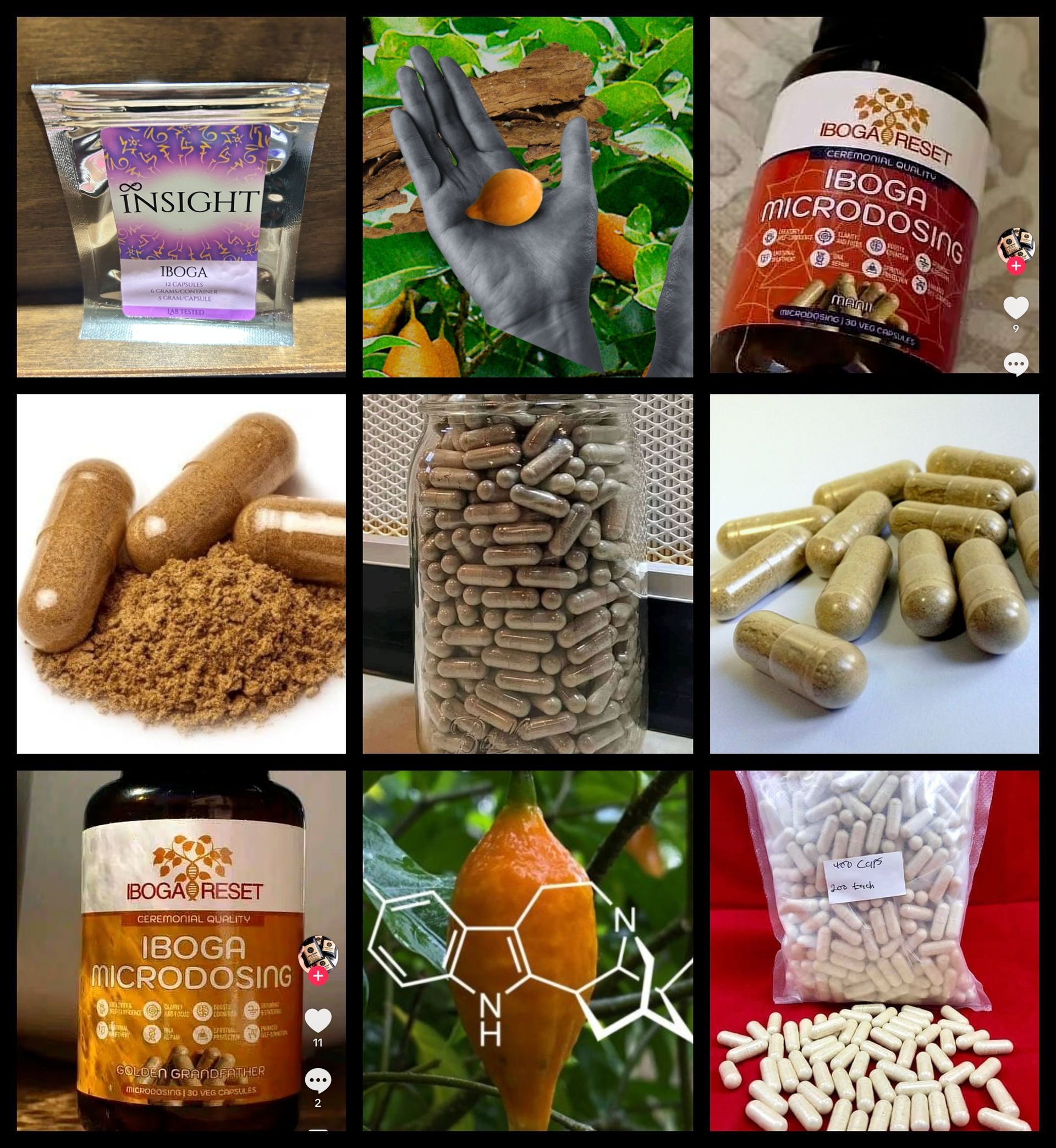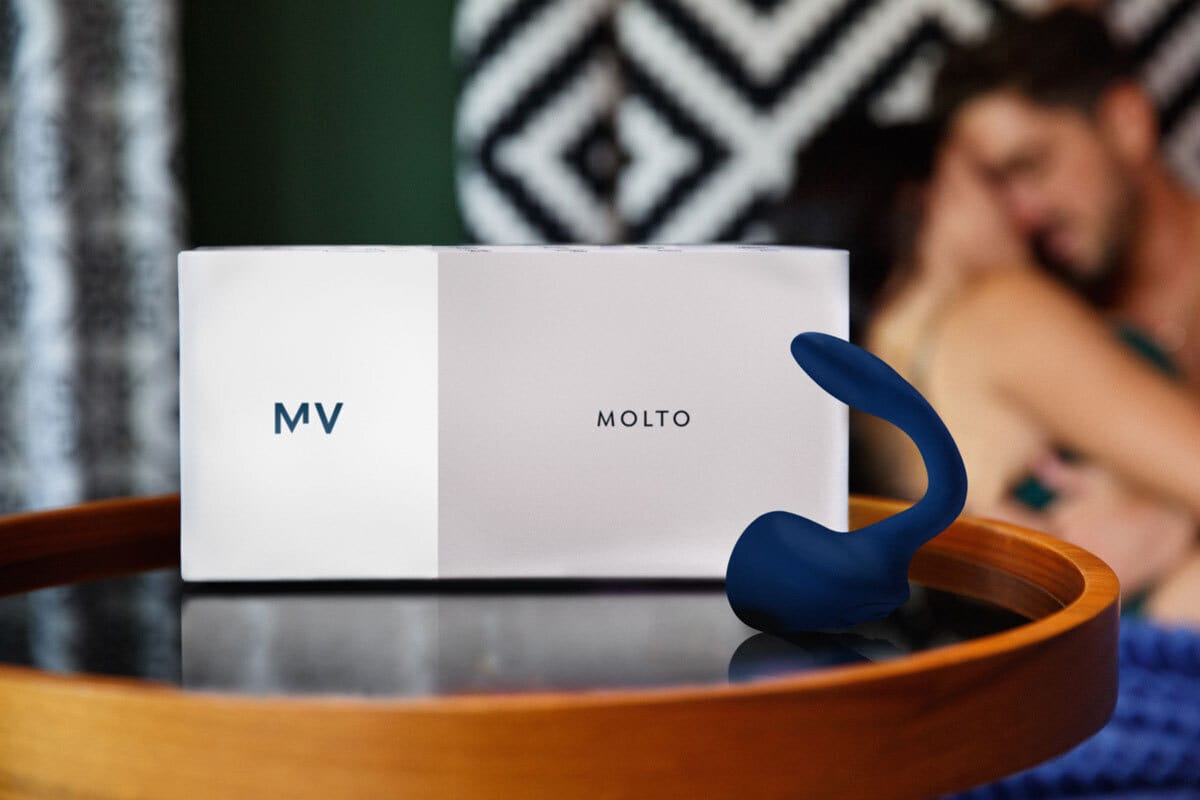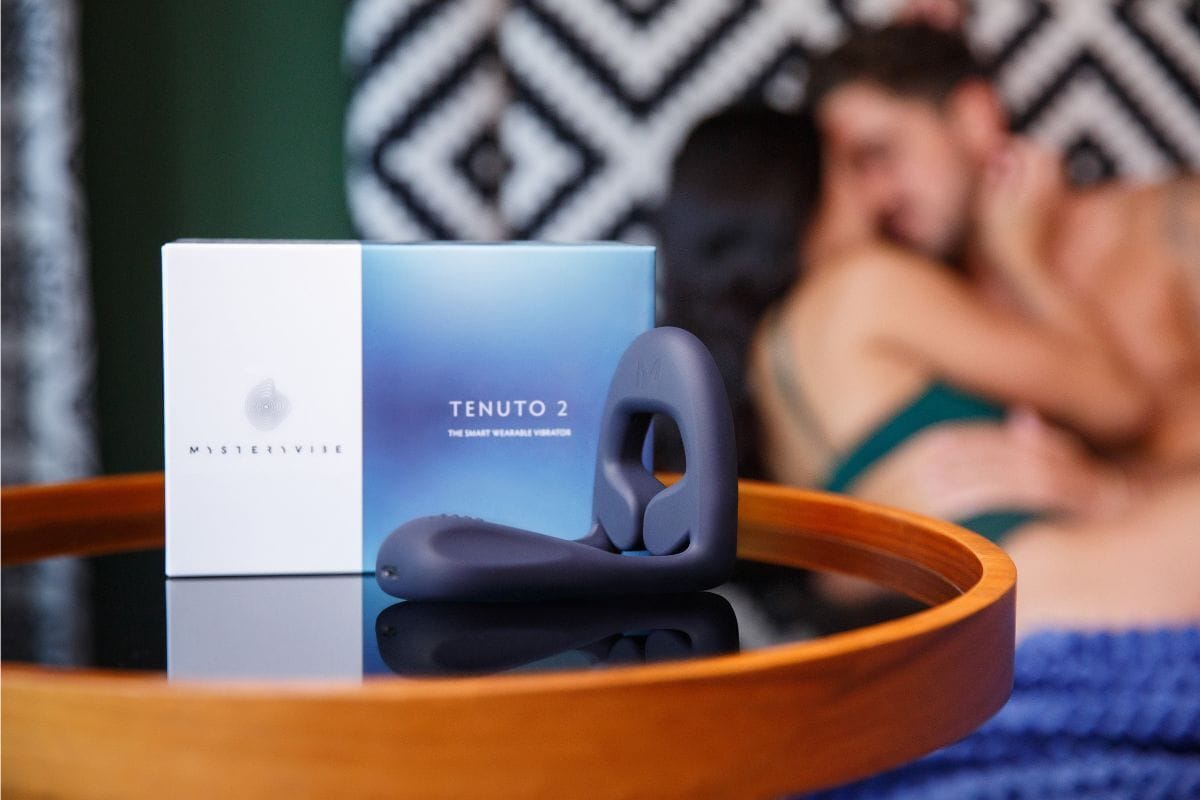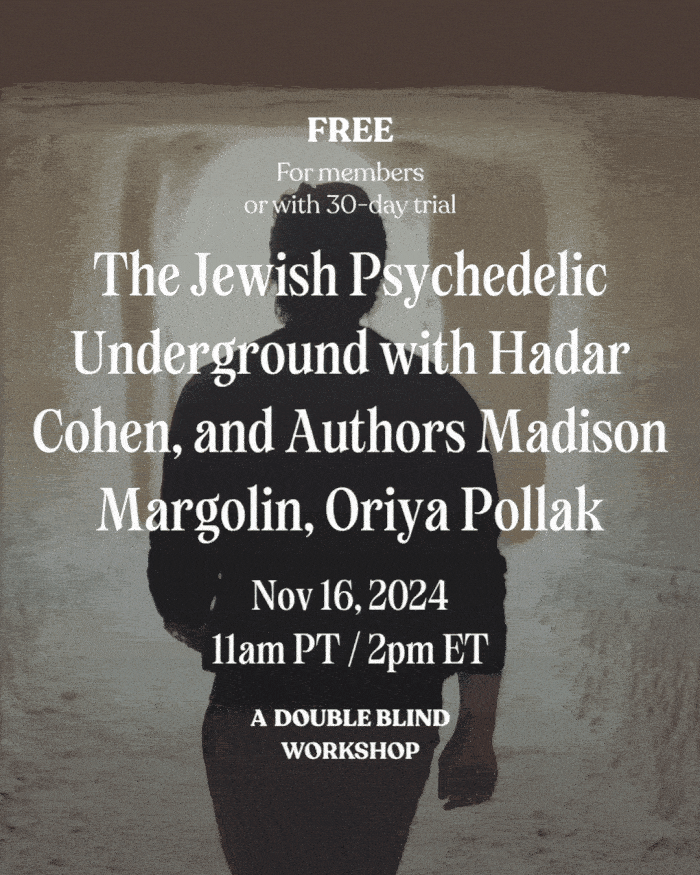- The Drop In by DoubleBlind
- Posts
- Would You Buy Iboga Off of Instagram or TikTok?
Would You Buy Iboga Off of Instagram or TikTok?
Another plant medicine with a history of Indigenous use has entered the social media marketplace.


Your weekly dose of
psychedelic insights and news

You Can Now Buy Iboga on TikTok. What Could Possibly Go Wrong?
A sacred African medicine is becoming a wellness trend on social media, and it’s raising tough questions about profit, access, and appropriation..
By Dennis Walker
We’ve all seen the rise of psychedelics as medicine. They have entered the mainstream cultural conversation and have gained scientific legitimacy as well, ushering in both excitement and a tangle of global, macro-societal questions. One prime example is the emergence of the Iboga consumer-packaged goods market, which is now advertised across social media platforms like Meta and TikTok.
Anyone even tangentially involved in the psychedelic space has probably noticed the irony. Psychedelics are now being advertised all over social media — yes, on the very same platforms that routinely censor, suspend, and/or ban legitimate educators and advocates. Post a link to a peer-reviewed study, and you risk losing your audience. Yet just a couple of scrolls down, and you’ll find ads for telehealth ketamine clinics offering to send lozenges to your doorstep or microdosing capsules from random white-label brands that may not even contain what’s labeled on the back of the package.
Blasting out ads for consumer-branded iboga products to everyone on social media has drawn the ire of psychedelic advocates. But the social media-ification of plan-based psychedelics is, in fact, a natural extension of the drive to medicalize these compounds and box them into a profit-oriented Western medical framework. The “honeymoon” phase of the psychedelic renaissance is over. Now, we’re at a point where the reality of free market economics is clashing with the idealistic goals of institutions that want to keep these powerful substances tightly controlled in order to maintain bottlenecked systems of access. Neither parties are taking into consideration the Indigenous stewards of these plants and compounds, or their cultural contexts.
How do we integrate ancient wisdom into modern spiritual life? How do we ensure that the very tools and resources that elevate us don’t become the traps that limit us? Join us for a compelling conversation through it all next Sunday, November 16th at 11am
After the FDA rejected MDMA-assisted therapy as an approved treatment for PTSD in the summer of 2024, advocates for psychedelic therapy were in need of a new north star to help them sell the vision of psychedelic medicine. What did they turn to? Ibogaine, a naturally occurring alkaloid derived from the root bark of the Tabernanthe iboga shrub, which holds tremendous spiritual significance in Bwiti ceremonies. Iboga is native to Gabon, a coastal West African country roughly the size of Colorado.
Ibogaine has captured scientific and cultural attention for its purported ability to interrupt opioid addiction and catalyze psychological breakthroughs, despite its legal gray zone and well-documented medical risks. This profoundly strong substance has emerged as the heir to MDMA for the medicalized psychedelic crowd. It is being touted for its ability to not only unclinch the grips of addiction, but also treat PTSD, eating disorders, traumatic brain injuries, and various other indications while helping people see they are a “child of god,” according to Iboga evangelist, attorney, and advocate Bryan Hubbard.
Continue reading after our partner message below.
Together With MV.Healtth
Feel the electric release every man dreams of.
Ever had an orgasm so intense it feels electric? We’re not talking about your average climax — we’re talking about the power of a prostate orgasm. A surge of pleasure that hits harder, lasts longer, and leaves your whole body buzzing.
Few men have felt it, but Molto makes it possible. Ultra-slim, bendable, and designed to deliver a prostate massage that’s as stimulating as it is surreal.
With Molto, it’s more than pleasure. Expect stronger erections and more intense ejaculations with a doctor-designed device that also contributes to overall prostate wellbeing. Its powerful vibrations stimulate the prostate to boost arousal, intensify release, and keep performance solid — all from the privacy of home.
Don’t wait! Join 14,000 men already prioritizing performance with Molto. Save 30% plus an EXTRA 15% with code DB15.
As Western hype grows around iboga’s purported power to treat mental health conditions, efforts are simultaneously underway to medicalize and commercialize it, ultimately stripping the plant of its Indigenous roots and traditions. The result is an emerging iboga consumer-packaged-goods market, where a sacred medicine once central to Bwiti spiritual practice is repackaged and sold as a sterilized (and potentially very dangerous) wellness product.
Social Media platforms like TikTok and Meta have recently become awash with targeted ads for iboga microdosing capsules branded in sleek packaging. The Tryptomics Elevated Natural Product testing lab in Colorado even had an iboga category for people to submit to during its 2024 psychedelic cup, alongside mescaline, DMT, and psilocybin raw plant material and products. It did not receive any samples for submission, however.
Perspectives on consumer packaged iboga products vary as widely as the modern political spectrum. On LinkedIn, a platform that has arguably (and hilariously) become the primary bastion of free speech regarding psychedelics among social media platforms, Clint Kyles of the Psychedelic Christian Podcast responded to a post of mine showcasing a pair of packaged iboga products that I received a targeted ad for on TikTok.
“I honestly have mixed feelings about all of this psychedelic commodification,” Kyles said. “I submit commodified tobacco, alcohol, & pharmaceuticals as potentially hazardous examples” of what happens when powerful substances get commodified.
When ancient plant medicines woven into the social and environmental fabric of Indigenous cultures are stripped of their context and reframed as individualized treatments for Western pathologies, the leap to packaging and selling them as consumer products becomes almost inevitable. In iboga’s case, the slow grind of the medical–pharmaceutical machine has become its own worst enemy. While regulators and lobbyists drag their feet — each layer of bureaucracy extracting value from the process — the free market moves ahead. It doesn’t need permission. It only needs supply and demand.
And with recent high-profile campaigns touting the therapeutic efficacy of MDMA, psilocybin, and now ibogaine, public demand has soared far beyond what the so-called architects of the psychedelic renaissance can supply.
Beyond this, there’s a little-known protocol called the Nagoya Protocol, which is explicitly designed to ensure access and benefit sharing with Indigenous peoples regarding the commercialization of genetic resources and traditional knowledge. For all of former Governor of Texas Rick Perry’s high-profile advocacy around the need to medicalize ibogaine and grant veterans access to it, I have never once heard him reference the Nagoya Protocol and outline how integrating ibogaine into a statewide medical framework in Texas will contribute reciprocal value to the original stewards of this medicine.
It is precisely this type of reductionist hubris around the pharmaceuticalization of ancient plant medicines and their synthetic derivatives that continues to plague the medicalization of psychedelics. Why? Because the free market is stepping in to fill the gap, which is affording access to people who don’t have political capital or platforms to launch well-funded PR campaigns aimed at containing these molecules within tightly controlled and hermetically sealed routes of clinical access. But does that mean we should be buying microdoses of iboga or ayahuasca or other plant medicines on social media? Probably not!
After centuries of resource extraction and violent subjugation of Africa and its people, iboga is in the hot seat as the latest commodity to be decontextualized from its socioenvironmental habitat and foisted into the global market.
While it’s generally inadvisable to purchase a random “Ceremonial Grade” Iboga supplement from an anonymous white label brand on TikTok — because in the absence of testing these products and publishing the results, no one knows what’s actually in them — the principle of who gets to decide upon routes of access to powerful entheogens (and who benefits from their trade) remains a vital consideration. This pattern extends to nearly all plant medicines with Indigenous roots, as their cultural knowledge and intellectual property become caught up in global economic forces and commercial markets.
So, who gets to shape the ethics and dynamics of the emergent market around Iboga and Ibogaine?
As the old saying goes, “Build a better mousetrap, and the world will beat a path to your door.” In this case, the free market keeps outpacing the supposed gatekeepers of psychedelic medicine, even if that means selling sacred medicines on TikTok.
Together With MV.Health
Breakthrough into a new dimension of pleasure for two.
It’s not just a vibrator. It’s a whole new way to experience pleasure together.
Tenuto 2 is a wearable vibrator designed for both partners, simultaneously stimulating the clitoris, vulva, and penis. It helps him stay harder and last longer, and gives her good vibrations in all the right places. Elevate the intensity of sex with 16 different speeds, control the vibration patterns, and even create and save that custom vibe that hits both your spots equally every time.
Because better sex is about connection, exploration, and mind-blowing pleasure.
And for a limited time, you can save 30% plus an EXTRA 15% off with code DB15.
Your best night is just a click away.
How was today's Dispatch? |
💌 If you loved this email, forward it to a psychonaut in your life.
Editorial Process
DoubleBlind is a trusted resource for news, evidence-based education, and reporting on psychedelics. We work with leading medical professionals, scientific researchers, journalists, mycologists, indigenous stewards, and cultural pioneers. Read about our editorial policy and fact-checking process here.




Reply